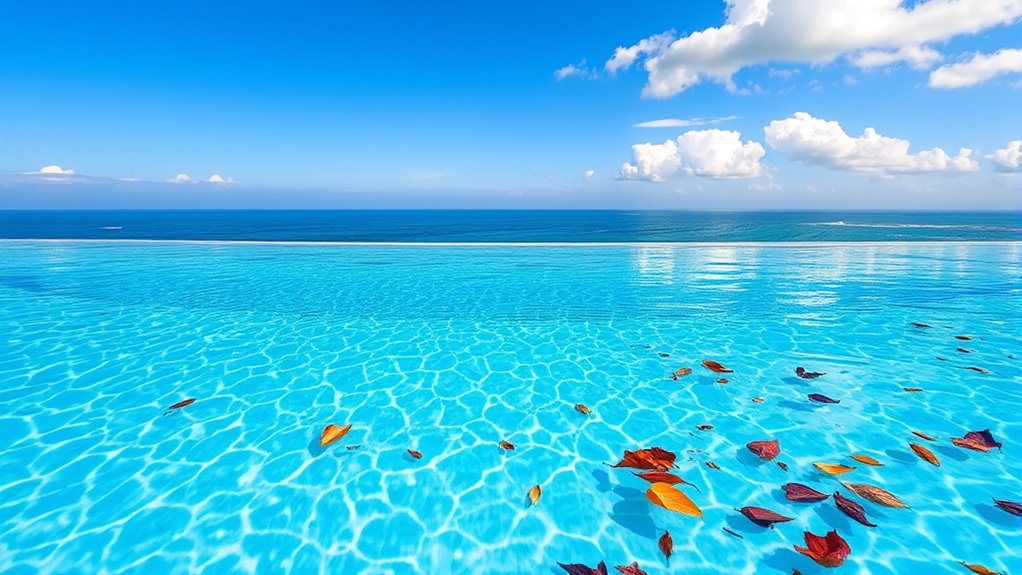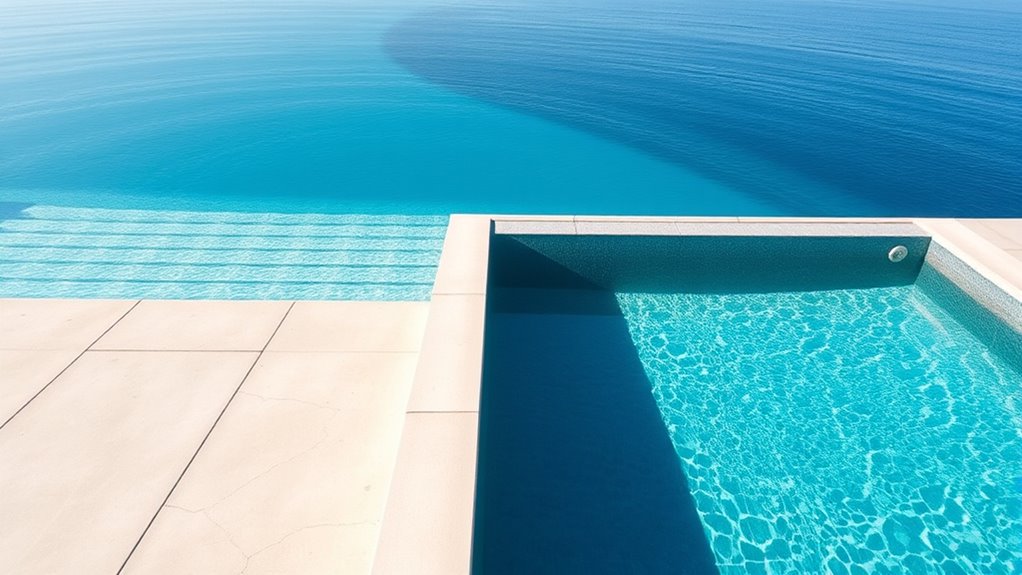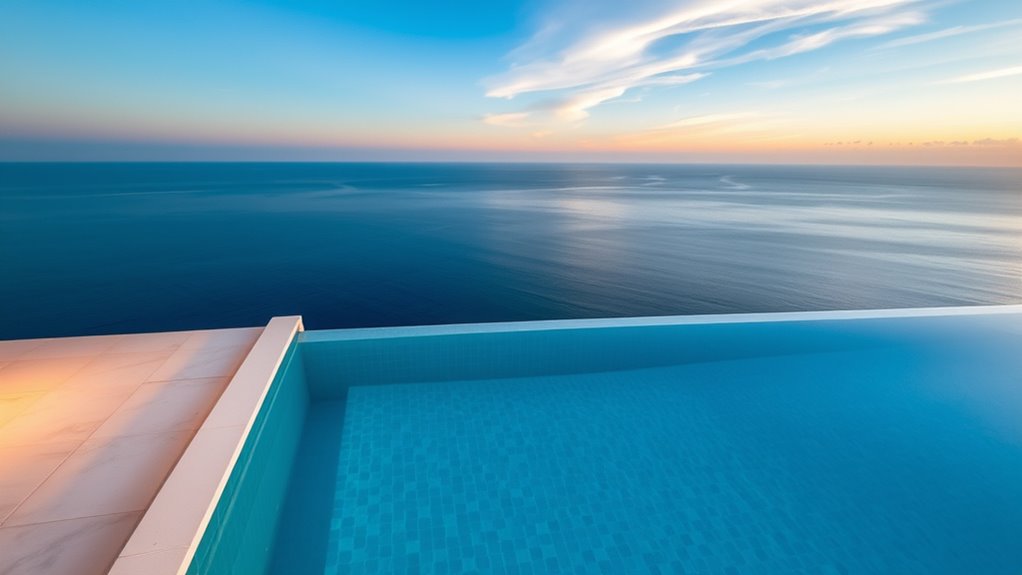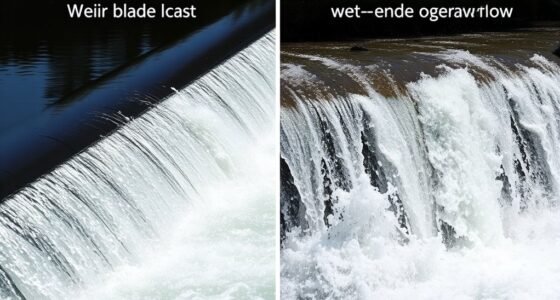Infinity pools require more complex design, advanced water circulation, and high-end filtration systems, which means higher maintenance and ongoing costs. You’ll need to regularly inspect for leaks, keep pumps and filters in top shape, and manage constant water flow, leading to increased energy bills. Standard pools are simpler, cheaper to operate, and easier to maintain long-term. Want to see which option fits your budget and lifestyle? Keep exploring for more details.
Key Takeaways
- Infinity pools require more complex engineering, regular sealing, and structural inspections, increasing maintenance compared to standard pools.
- They use larger, more powerful pumps and advanced filtration systems, leading to higher energy consumption and operational costs.
- Continuous water flow over the edge necessitates frequent equipment checks and repairs, raising long-term maintenance expenses.
- Standard pools have simpler designs with straightforward circulation, resulting in easier upkeep and lower ongoing costs.
- Modern filtration innovations like UV sterilization improve water quality while reducing cleaning and chemical treatment efforts.
Design and Structural Complexity

When comparing the design and structural complexity of infinity pools and standard pools, it’s clear that infinity pools require more intricate engineering. You’ll notice that creating the illusion of water extending seamlessly to the horizon demands precise calculations and advanced construction techniques. The key feature, the infinity edge, involves a carefully engineered catch basin or trough that’s often hidden from view. This setup must be perfectly aligned to ensure water flows smoothly over the edge without splashing or spilling. Reinforcing the structure is also essential to handle the unique water dynamics. In contrast, standard pools follow a straightforward rectangular or geometric shape, making their design simpler and easier to build. Overall, infinity pools demand a higher level of planning, precision, and technical expertise. Structural engineering plays a critical role in ensuring the stability and safety of these complex features.
Water Circulation and Filtration Systems

When it comes to water circulation and filtration, you’ll want to examine how pump systems perform in both pool types. The way water flows affects clarity and energy use, so understanding flow dynamics is key. Plus, advancements in filtration technology can make a big difference in maintaining clean, healthy water effortlessly. Additionally, incorporating high-efficiency filtration can optimize water quality while reducing operational costs.
Pump Systems Efficiency
Pump systems play a vital role in maintaining water quality and clarity in both infinity and standard pools, making their efficiency indispensable. A high-efficiency pump ensures peak water circulation, reducing energy costs and preventing stagnation. Infinity pools often require more powerful pumps to support their larger volume and unique water flow, which can increase operational costs. Standard pools typically have smaller pumps, making maintenance simpler and less expensive. You should look for pumps with variable speed settings, as they allow you to adjust flow rates based on your needs, saving energy. Regular maintenance, such as cleaning filters and checking for wear, keeps your pump operating efficiently. Choosing the right pump system ensures your pool remains clear, safe, and cost-effective to run. Additionally, understanding energy efficiency can help you select equipment that minimizes operational costs over time.
Water Flow Dynamics
Water flow dynamics are essential for maintaining clean, healthy pools by ensuring effective circulation and filtration. Proper flow keeps chemicals evenly distributed and prevents stagnation. In an infinity pool, water flows smoothly over the edge, creating a continuous cascade that promotes constant movement. Standard pools rely on pumps and skimmers to circulate water efficiently. To optimize water flow, consider these key factors:
- Pump placement and size to match pool volume.
- Proper positioning of inlets and outlets for even circulation.
- Regular cleaning of skimmers and filters to prevent blockages.
- Adjusting flow rates to avoid turbulence or dead zones.
Filtration Technology Advances
Advances in filtration technology have substantially improved how pools maintain clean and clear water. Modern systems now efficiently remove debris, bacteria, and chemicals, reducing maintenance time. Variable-speed pumps, multi-stage filters, and UV sterilization offer better water quality with less energy use. These innovations ensure your pool stays hygienic, saving you effort and costs over time. To understand their impact, consider this table:
| Technology | Benefit | Ideal For |
|---|---|---|
| Variable-speed pumps | Energy savings | Large pools |
| Multi-stage filters | Superior filtration | Infinity pools |
| UV sterilization | Disinfects without chemicals | Sensitive environments |
| Cartridge filters | Easy maintenance | Small pools |
| Ozone systems | Oxidizes contaminants | High-use pools |
Additionally, advancements in water circulation systems contribute to more uniform water quality and reduced stagnation. These advancements make pool upkeep more effective and eco-friendly.
Regular Cleaning and Debris Removal

Regular cleaning and debris removal are essential for keeping both infinity pools and standard pools in top condition. If you neglect this step, dirt and leaves can clog filters, cause algae growth, and damage your pool’s equipment. To stay ahead, consider these key tasks:
Regular cleaning prevents damage and keeps pools pristine and inviting.
- Skim the surface daily to remove leaves, insects, and debris.
- Use a pool vacuum weekly to clean the bottom thoroughly.
- Clear out skimmer baskets regularly to ensure proper water flow.
- Brush the pool walls and tiles to prevent algae buildup.
- Maintaining appropriate water chemistry is crucial for preventing algae and bacterial growth.
Chemical Balance and Water Quality Maintenance

Keeping your pool’s chemicals balanced is key to safe, clear water. You’ll need to monitor chemical levels regularly to prevent fluctuations, especially with different pool types. Managing pH and stabilizing water clarity are essential for maintaining ideal water quality. Utilizing smart technology can help automate and optimize this process for better results.
Chemical Levels Stability
Maintaining stable chemical levels is essential for ensuring safe and clear water in both infinity and standard pools. When your chemicals stay balanced, you reduce algae growth, prevent skin and eye irritation, and protect your pool equipment. To keep things consistent, focus on these key factors:
- Regular testing of pH, chlorine, and alkalinity levels.
- Adjust chemicals promptly to correct imbalances.
- Use automatic dosing systems for precision.
- Maintain proper filtration and circulation to distribute chemicals evenly.
- Understanding chemical balance principles helps in maintaining water quality effectively.
Water Clarity Control
Consistent chemical balance directly impacts water clarity, making it easier to see through your pool and enjoy its aesthetic appeal. When the water’s chemistry is well-maintained, particles and algae are less likely to cloud the surface. Regular testing and adjusting of chemicals like chlorine, alkalinity, and stabilizers are essential. A clear pool not only looks inviting but also reduces eye irritation and equipment strain. To help you keep track, here’s a quick overview: Proper chemical levels are vital to maintaining water clarity and ensuring a safe swimming environment.
| Chemical | Ideal Range | Purpose |
|---|---|---|
| Chlorine | 1-3 ppm | Disinfects water |
| pH Level | 7.4-7.6 | Ensures chemical effectiveness |
| Alkalinity | 80-120 ppm | Stabilizes pH |
| Stabilizer (Cyanuric Acid) | 30-50 ppm | Protects chlorine from UV degradation |
| Calcium Hardness | 200-400 ppm | Prevents water corrosion or scaling |
Ph Balance Management
Proper pH balance is essential for water quality and chemical effectiveness in your pool. Maintaining the right pH level ensures comfort, prevents corrosion, and keeps chlorine working efficiently. When pH is too low, your water can become acidic, causing irritation and damage. If it’s too high, algae and bacteria thrive, and chemicals become less effective. To manage pH effectively, consider these steps:
- Test regularly using a reliable kit to catch fluctuations early.
- Add pH increasers or decreasers as needed to stay within 7.2–7.6.
- Maintain proper chemical levels to prevent pH swings.
- Rinse and clean test tools to ensure accurate readings.
- Staying informed about AI-driven security systems can help safeguard your pool equipment from cyber threats.
Consistent pH management keeps your pool water clean, safe, and inviting.
Energy Consumption and Operating Costs

While infinity pools often create a stunning visual effect, they tend to consume more energy than standard pools because of their complex filtration systems, additional pumps, and constant water circulation needed to maintain the seamless edge. These features increase electricity usage, leading to higher operating costs. You’ll also spend more on maintenance, as the advanced systems require frequent inspections and repairs. Consider the table below to compare costs:
| Feature | Infinity Pool | Standard Pool |
|---|---|---|
| Pump System | Multiple, high-capacity | Basic, single pump |
| Filtration System | Advanced, continuous cycle | Simpler, periodic cycle |
| Energy Costs | Higher | Lower |
Longevity and Wear-Related Maintenance

Although infinity pools are designed to be visually stunning, they often require more careful maintenance to guarantee their longevity. The unique features, like the vanishing edge, make them more vulnerable to wear over time. To keep yours in top shape, pay attention to:
Infinity pools are stunning but require diligent maintenance to ensure lasting beauty and function.
- Sealant integrity – Regularly check and replace sealants to prevent leaks.
- Structural wear – Inspect the edge and surrounding areas for cracks or erosion.
- Water quality – Maintain proper chemical levels to avoid damage from algae or corrosion.
- Pump and filter systems – Keep equipment clean and serviced to prevent breakdowns.
- Durable materials can help reduce the impact of wear and extend the lifespan of the pool components.
Safety Considerations and Access Requirements

Safety considerations and access requirements are essential when installing and using an infinity pool, as the design’s unique features can pose risks if not properly managed. You need to ensure secure barriers or fencing to prevent accidental falls, especially since infinity edges often appear seamless and inviting. Proper lighting is crucial for visibility at night, reducing the risk of slips or missteps. Access points, like ladders or steps, should be sturdy and easy to use, with non-slip surfaces. Keep a close eye on children or inexperienced swimmers, as the open edges can be dangerous. Regular maintenance of safety equipment, such as alarms or covers, is vital to prevent accidents. Prioritizing safety and proper access helps you enjoy your infinity pool responsibly and minimize hazards.
Cost of Repairs and Long-Term Upkeep

Maintaining an infinity pool can be more costly and complex over time due to its unique design features. The continuous edge and specialized water circulation systems require extra attention and maintenance. You’ll likely spend more on repairs and upkeep. Here are four key factors to contemplate:
- Sealant and Edge Repairs: The infinity edge needs regular sealing to prevent leaks and water damage.
- Pump and Filtration Maintenance: The specialized pumps and filters may need frequent servicing or replacement.
- Water Loss and Chemical Costs: Continuous water circulation can lead to higher chemical and water expenses.
- Structural Integrity Checks: The unique structure demands ongoing inspections to avoid costly repairs down the line.
Frequently Asked Questions
Are Infinity Pools Suitable for Small Backyard Spaces?
Yes, infinity pools can be suitable for small backyards if you choose a compact design and work with a skilled installer. Keep in mind, they often require more maintenance due to their unique structure and water features. You’ll need to plan carefully for space, budget, and upkeep. With proper planning, an infinity pool can add a luxurious touch to your small outdoor area without overwhelming it.
Can Both Pool Types Be Heated Efficiently?
Yes, both infinity pools and standard pools can be heated efficiently, but your options depend on your pool type. Infinity pools often require more powerful heating systems because of their larger surface area and unique design, which can increase energy use. Standard pools typically heat more effectively and cost-effectively. To maximize efficiency, consider solar heaters or energy-efficient heat pumps, regardless of your pool type, and make certain your system is properly maintained.
Do Infinity Pools Require Special Permits or Zoning Approvals?
Yes, infinity pools often require special permits or zoning approvals due to their unique design and potential impact on property safety and drainage. You should check with your local building department before construction. They might need detailed plans, safety features, or additional inspections. Getting these approvals guarantees your pool complies with regulations and avoids legal issues later. Always consult with professionals to navigate the permitting process smoothly.
How Does Pool Depth Impact Maintenance Needs?
Deeper pools generally require more maintenance because they hold more water, increasing the effort needed for cleaning, chemical balancing, and filtration. You’ll spend more time skimming debris and maintaining equipment in a deeper pool. Additionally, deeper water can make it harder to access certain areas for cleaning or repairs. So, if you want easier upkeep, a shallower pool might be a better choice, as it demands less frequent and intensive maintenance.
Are There Eco-Friendly Options for Pool Maintenance?
Are eco-friendly options worth considering for your pool? Absolutely. You can use solar-powered pool heaters, energy-efficient pumps, and natural water treatment systems like salt chlorination or UV sterilizers. These choices reduce chemical use and energy consumption, helping the environment while lowering your bills. Have you thought about installing a cover to minimize evaporation and debris? Embracing eco-friendly maintenance not only benefits the planet but keeps your pool cleaner longer.
Conclusion
Choosing between an infinity pool and a standard pool is like selecting a partner—you’ll want one that fits your lifestyle and maintenance willingness. While infinity pools offer breathtaking views, they demand more attention and care, much like tending a delicate garden. Ultimately, weigh the elegance against the upkeep, and remember, a well-maintained pool is the gateway to endless relaxation—turning your backyard into a sanctuary that beckons you home.










